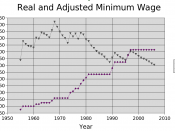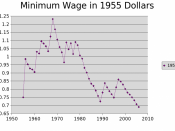Amanda Coles
Professor John Hoback
Macroeconomics (WB FA13)
Case Against Raising the Minimum Wage
The raising of the federal minimum wage will negatively affect individuals, small business, and the labor market, therefore; the minimum wage should not be raised. The federal minimum wage ($0.25 per hour) was instituted in 1938 in the Fair Labor Standards Act and has been raised at least 22 times since then. Originally, it covered the mining, manufacturing, and transportation industries but now covers over 85% of the workforce. Currently, there are states that have implemented a minimum wage higher than the federal current of $7.25 per hour (Wilson).
The subject of raising the federal minimum wage was in the news after President Obama announced in his State of the Union address (January 20130) he would like the federal minimum wage to be raised from $7.25 per hour to $9.00 per hour by 2015.
Of course, individual states are allowed to raise their minimum wages as they see fit. For example, Pennsylvania has a minimum of $7.25 per hour. Starting a few months ago, President Obama announced he wanted to raise the minimum wage to $10.00 per hour. Recently, the voters of Seatac, Washington voted for the minimum wage of $15.00 per hour. Germany has a national minimum wage of $11.50 per hour as converted into American dollars and fast food workers all over the nation are demanding a wage of $15.00 per hour. While the idea of raising the federal minimum wage sounds like an excellent idea that will help the individual and the economy it will not.
Increasing the federal minimum wage will negatively affect individuals because it will not alleviate poverty. Using the $9.00 per hour and standard workweek of 40 hours per week and 52 weeks a year (not...


